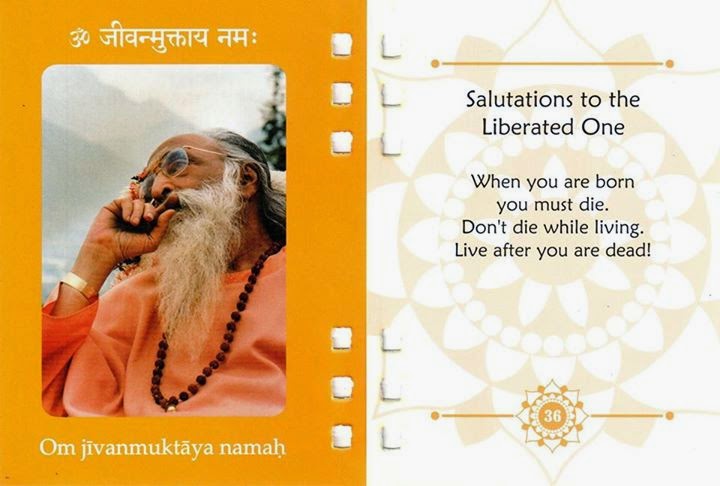Gita : Ch-11. Slo-48.
Srimad Bhagavad-Gita :
Chapter-11. ( Visvarupa-darsana-yogam)
Slokam-48. ( Lord Krishna : O best of the Kuru warriors, no one before you has ever seen this universal form of Mine, for neither by studying the Vedas, nor by performing sacrifices, nor by charities or similar activities can this form be seen. Only you have seen this.)
na veda-yajnadhyayanair na danaiah
na ca kriyabhir na tapobhir ugraih,
evam-rupah sakya aham nr-loke
drashtum tvad anyena kuru-pravira.
kuru-pravira = O best among the Kuru warriors;
nr-loke, tvad anyena = in the world of human beings apart from you no one can;
veda-yajna-adhyayanaih = Vedam, yajnam, svadhyayam, with these;
evam rupah aham = Me in this form ( Visvarupam);
drashtum na sakyah = not possible to see;
danaiah na, kriyabhih ca na = by charity or by activities;
ugraih tapobhih ca na = by hard tapas and sadhanas not possible ( to see Lord's Visvarupam).
As it is impossible to behold the visvarupa or divine universal form without the blessings of Lord Krishna, by His grace Arjuna was able to see it and thus was fortunate.
This Lord Krishna is affirming this with statements like na veda yagnadhyayanair meaning not by study of the Vedas or the performance of Vedic rituals.
No living entity in the material worlds of mortals can see the visvarupa without Lord Krishna's grace.
Even if one studies and learns the complete Vedas, and even if one perfects and executes the Vedic rituals such as the Agni Hotra regularly, and even if one gives in charity to worthy persons such as land, daughters in marriage, food for the hungry, and even if one performs austere penance such as the soma vrata or lunar vow which is eating mouthfuls of food, one each day up to 15 each day and back down again to one a day for one month.
All these activities even though performed perfectly will not qualify one to see His visvarupa and Lord Krishna uses the particle na meaning not, four separate times to emphasise the point that without His grace it is impossible to ever behold His visvarupa.
The Katha Upanisad I.II.VII states: The Supreme Lord is He whom even when hearing about is known not.
Also in slokam I.II.XXIII of the Katha Upanisad it states : -
The atma or soul is not to be realised by the intellect, nor by learning, nor by instruction.
The atma is to be realised only by one whom the soul itself selects due to possessing pure bhakti or exclusive loving devotion to the Supreme Lord.
To such a great evolved being does the atma reveals itself.
Having seen Lord Krishna's visvarupa or divine universal form whose vision was first beheld by Arjuna in the material worlds and very difficult to behold.
Arjuna was blest as no one else on the battlefield was capable of seeing the visvarupa.
The words veda-yajna refers to books on rituals for propitiating the Supreme Lord such as the Kalpa Sutras.
Therefore Lord Krishna is declaring that neither study of the Vedas and books on rituals and ceremonies such as Agnihotra or offering ghee daily into the sacred fire, nor by giving profusely in charity or undergoing extreme penances like Chandrayana which is increasing and decreasing the food intake each day according to the bright and dark fortnights of the moon cycle which goes from one mouthful of food a day to 15 mouthfuls of food each day and back down again in one month.
By none of these methods singularly or all together can one qualify themselves in order to see His visvarupa.
It was only by the grace of Lord Krishna that Arjuna alone was able to see it on the battlefield.
Sanjaya who was best to see everything that transpired on the battlefield by the avatara or incarnation Vedavyasa, saw the visvarupa in his mind at the palace of the blind King Dhritarashtra and thus he could describe it to him.
Even by devout and diligent study of the Vedic scriptures and their ancillaries it is not possible to witness Lord Krishna's visvarupa or divine universal form.
Only due to Arjuna's unflinching devotion and friendship to the Supreme Lord Krishna throughout his life was it possible him to be graced to see this form, those without devotion can never qualify to see it.
Here it is explained that not by study of the Vedas, nor by charity, rituals or extreme penance can the visvarupa or divine universal form be seen by anyone who does not possess bhakti or exclusive loving devotion unto the Supreme Lord Krishna.
To be continued ....





Comments
Post a Comment